- Home
- Brian Keene
Tequila's Sunrise Page 2
Tequila's Sunrise Read online
Page 2
Gripping his bow tightly, Chalco clenched his teeth and walked on. He passed by a row of stone monuments—a throne symbolizing Moctezuma’s rule, and several giant heads representing the previous rulers. Slaves scrubbed bird droppings from the carvings. They hummed as they worked. The tune was sad.
When he arrived at the marketplace, the city came to life, bustling with sound and activity. Voices cried out between the stalls, bartering and selling, and alternately praising or beseeching Yacatecuhtli, the god of merchants. The market thrummed with smells and sights. There was livestock and wild game: rabbits, lizards, serpents, quail, partridges, turkeys, pigeons, parrots, and goats—some alive and others freshly killed. He ignored these, thankful as always that he came from a clan of hunters. There was no need to spend money on such things when you could kill it yourself.
Flipping his bangs away from his eyes, Chalco passed by a row of apothecaries. In front of the structures, merchants sold medicinal herbs and roots, as well as charms and totems. There was a barbershop, a rug-maker, and a metalworker. On a small platform, sullen slaves—mostly the children of other slaves or prisoners of war from beyond Oaxaca’s borders—were sold like livestock. Sometimes, Chalco felt sorry for the slaves. But they were necessary. Prostitutes preened in a side-alley, ready to start another day. With so many of the men gone, their business was down. Craftsmen shouted, hawking their various wares and services. There were stalls of cotton, thread, sandals, animal skins, blankets, dyes, pottery, ceramic dolls, trinkets, amulets, rope, bricks and mortar, oils, paints, charcoal, beads, paper, tobacco, salt, gold, silver, precious stones like jade and amber, feathers and quetzal plumes, earrings and nose ornaments, weapons, tackle, wicker baskets, and even imported lumber (since Monte Alban had sparse woodlands).
Chalco’s mouth watered as he passed by maize, beans, maguey, peppers, cereals, squash, sweet potatoes, pumpkins, tomatoes, nuts, and chocolate. If the hunt was bountiful, he would sell some wild game on his return and buy some chocolate for his mother and siblings. That would make them happy. For the first time since his departure, Chalco smiled.
He reached the outskirts of the city and passed through the fields. Clan members and slaves worked alongside each other, tending rows of maize and beans, and gathering tree sap to make rubber and soap. An apiary buzzed with honeybees. Smoke curled from a burning sewage pit. A group of warriors—left behind to guard Monte Alban when the rest of the men had gone—wound their way along a narrow trail, traveling down into the valley below. Their faces were grim, their bodies painted. Chalco wondered where they were going, but didn’t ask.
After slinging his bow with gut-thread and readjusting his quiver and basket, Chalco headed farther up the mountain. It was easy travel at first. He stuck to the well-trod footpath, avoiding the prickly cacti. Soon, the city’s noise faded and the sounds of nature took over—the screech of a hawk far overhead (out of range of his arrows), the whisper of a spider clambering over a rock, a bush rustling in an all too- brief gust of wind. He saw no other people and no game, either. The countryside was deserted. The hot sun climbed higher into the sky and no further breezes were forthcoming. Chalco started to sweat. Thin beads of perspiration dripped from his forehead and upper lip. The steep, winding trail grew narrower, and then vanished altogether. Chalco pressed on, watching where he stepped, alert for snakes and scorpions. Both could penetrate the soles of his sandals. There was still no movement. He found some rabbit tracks in the dirt, but they were at least two days old. A sidewinder track followed after them. He wasn’t the only predator looking for game. He hoped the serpent had better luck than him.
The bow grew slippery in his sweaty hands. He spotted a brown lizard sunning itself on a flat stone, but it was too small to bother with—nothing more than a mouthful. It skittered away as he walked by. Pausing, Chalco knelt in the dirt and rooted through his basket. He pulled out the water skin, unsealed the beeswax with his thumbnail, and took a long drink of pulque, grimacing at the taste. Then he sealed it back up and pulled a lime from the basket. Continuing on his way, he bit a hole in the fruit, relishing the tangy peel. He sucked the juice out as he walked. Sweat ran into his eyes. Even this far from Monte Alban, the mountain still seemed deserted. It was as if all the wildlife had fled from the advancing Spaniards.
Boredom set in and instead of watching for game, Chalco daydreamed. He thought of his friends. He remembered their days spent playing tlachtli, or gathering in the main plaza to watch prisoners of war be sacrificed, or joining in the great feasts. He missed his friends. They rarely saw each other these days. Like him, their fathers had all gone to Tenochtitlan and the boys were left to provide for their clans. The only time he really got to see his friends anymore was at temple, and then they couldn’t speak freely.
His thoughts turned to Yamesha, and his stomach fluttered. More sweat stung his eyes, but now it wasn’t just from the heat. He hated the way Yamesha made him feel, but at the same time, it excited him. On the rare occasions that he got to talk with her, Chalco’s mouth refused to work. He tried hard to think of something clever or funny to say. Instead, he said nothing. When she looked at him, he looked away. When she smiled at him, he frowned. Yet she was never far from his thoughts. She was intoxicating—and terrifying. The worst part was that he didn’t understand why. What made the jeweler’s daughter so different than the other women in his life? His sisters didn’t have that effect on him. Neither did his mother or aunts. Why should it be otherwise with Yamesha? Why should he grow his hair long just to impress her? It made no sense.
Despite his conflicted emotions, Chalco really did want to marry her. At fourteen, he wasn’t old enough yet. Men from the clans could marry at twenty and the women at sixteen. But with all of the recent changes in Monte Alban, perhaps the priests would ease that restriction. After all, if, in his father’s absence, Chalco was now the head of his clan, why could he not enjoy all the benefits of adulthood? Couldn’t he and Yamesha perform the right of Tilmantli, just like any other young couple? They were of different clans and different blood, as required by law. That was enough. He pictured himself going before the clan council and seeking permission from the old woman matchmaker.
His father was there, celebrating victory over the invaders. His mother was smiling again, as were his sisters. So was Quintox.
I want to be just like you…
Lost in his fantasies, Chalco didn’t see the pheasant lurking inside a nearby thicket. Startled by his approach, the bird burst from the shrubs, squawking with fright. Its wings beat the air in an explosion of multi-colored feathers. Startled, Chalco jumped backward, dropping his bow. His heart beat faster. As the pheasant flew away, he scrambled to retrieve the weapon. He notched an arrow with trembling hands and tried to aim, but the bird was already out of range.
“Gods damn the fowl!” Chalco shivered, and then wondered why. It was the middle of the day. The sun was at its peak. He should be sweltering in the heat. Instead, his sweat had dried on his skin.
He glanced around, stunned. There were no familiar landmarks, no rockslides or canyons or caves that he recognized. Lost inside his head, thoughts consumed with Yamesha, he had wandered farther up the mountain than he’d ever been before. But how? Had he really been daydreaming that long? It didn’t feel like it. He pushed his hair back and looked up at the sun again. It was in the midday position. Impossible. How could he have wandered for so long, without falling into a chasm or tripping over a stone? How had he made it so far without coming to harm? Surely, the gods had watched over him. Had they guided him here, as well?
His shock gave way to curiosity. An overwhelming sense of adventure stirred inside him. If the gods had indeed guided him here, he reasoned, there must be a purpose behind it. He decided to explore farther. If anything, perhaps the wildlife would be more plentiful here. As long as he didn’t kill anything too heavy—like a wolf or a deer— he shouldn’t have trouble hauling it back to Monte Alban.
***
After washing down
his lunch with a sip of pulque, Chalco pressed on. Slinging his bow over his back, he scaled a small cliff, his agile fingers expertly finding the right cracks. He jumped over a deep crevice. A jaguar’s skeleton lay at the bottom, bleached bones pointing towards the mountaintop. He paid his clan’s totem animal a silent tribute. The air grew colder, the vegetation more sparse. Soon, his sandals crunched over a thin layer of snow. There were tracks in the frost—rabbit, coyote, and deer. Un-slinging the bow again, he notched an arrow, proceeding up the mountain with caution, his senses alert for any movement or sound.
He clambered up onto a small jumble of boulders and paused, staring back down at the city, and the valley far below it. A shimmering haze seemed to hang over Monte Alban. The buildings and pyramids seemed so small from this height, like tiny replicas rather than real structures.
“It is beautiful,” he whispered.
“Yes, it is.”
Chalco screamed.
“Oh, stop that,” the voice said. “You’ll scare everything away and have to return home empty-handed tonight.”
Chalco whirled around. He was alone, yet the speaker sounded like they were right beside him. It was a male voice, deep and calm, almost hypnotic. He scanned the mountainside. There was nothing to hide behind. The nearest boulder was too far away, and the only plants were a few thin, scraggly pines and a single agave plant. He was momentarily surprised to see an agave growing this far up the mountain, but before he could consider it further, the voice spoke again.
“Look again, Chalco. Look at your home.”
“W-who are you? Where are you?”
“I am one of the first. I am everywhere and in between. I am here with you.”
Chalco turned around in a circle, trying to find the source. The voice sounded like it was coming from four different directions at once.
“Y-you speak Nahuatl?” he asked.
“No,” the voice said. “You hear Nahuatl. I speak the language of my kind.”
“Are y-you a…god?”
Chalco’s voice was barely a whisper. In contrast, the other speaker laughed loudly. The sound boomed across the mountain, echoing off the rocks. Chalco began to tremble. Unable to hold the bow steady, he slung it over his back and drew his knife. Then he dropped into a defensive stance and held the weapon in front of him. This was no god. Surely it was a demon, or perhaps one of the giants his father spoke of. It would try to eat him if he didn’t fight it off. But where was it? The laughter faded. Silence returned.
“Please,” Chalco cried. “Please, demon. I have done nothing to you. If I am trespassing in your domain, then I am sorry. I was merely hunting and then—”
“Do not be afraid. I am no demon. Your first guess was right, even though it is such a small word. Although I am not a god in the true sense, your kind considers me a deity of sorts. I am a messenger.”
“W-what is your name? Who are you? Why can I not see you?”
“I have many names. The Burning Bush. The Hand That Writes. The Watchman. The Guardian. The Sleepwalker. The Doorman. The Gatekeeper. But none of these are my secret name. I cannot tell you my real name. It is not for you to know. Names have power. Your people call me Huitzilopochtli. You may call me that as well, if you like.”
Gasping, Chalco dropped the knife and fell to his knees. A sharp stone cut into his flesh, but he did not cry out. Instead, he bit his lip, lowered his eyes, and begged forgiveness. Huitzilopochtli, the guardian spirit of his people, the messenger of the gods, the Hummingbird Wizard, second only to Great Quetzalcoatl himself!
It was Huitzilopochtli who had guided the Tenochas before they settled in Oaxaca. Back then, they’d been nothing more than a wandering tribe of mongrels, the cast-offs and misfits of all the other regional tribes. They roamed the wilderness, lurking at the edges of other civilizations until they were chased away. They were a demoralized, decadent people. Then Huitzilopochtli appeared and blessed them with advice and wisdom. He told them to continue wandering. They were to be fierce but cautious, avoiding combat whenever possible, but not shrinking from their enemies either. He told them to send scouts ahead. The pioneers planted maize along the way. When the harvest was ready, they settled that area and then sent more pioneers ahead to the next location. As they traveled, Huitzilopochtli admonished them to keep him with them at all times, carrying him before them like a banner. Sacrifices were to be made in his honor, as he was a messenger for the gods and deserved tribute. The priests fed him on still-beating human hearts.
The Tenochas complied with all of his demands, and within a few generations, they ruled over all of Oaxaca, vanquishing the other tribes in the region. No longer demoralized, they were lords of the world.
Sadly, as time passed, the priests forgot about Huitzilopochtli. After all, he was merely a messenger of the gods, rather than one of the gods himself. Instead, they worshipped Quetzalcoatl and the rest of their pantheon. Chalco’s generation was unsure what Huitzilopochtli even looked like. Chalco had always assumed that he was a hummingbird of some kind. He did so now, as well, and glanced up at the sky, looking for birds, but the sky was empty.
“You must turn your eyes to the ground.”
“But where, lord? I do not see—”
“Here. On the agave.”
Chalco crept closer to the plant. There, on one of the fronds, was a tiny, segmented worm no longer than his thumb and thinner than his arrow shafts. It had a black head and a pale, white body. Two pinprick eyes stared up at him.
“Oh…” Chalco whispered.
The worm winked.
Chalco’s hands went numb. His ears rang. He thought that he might pass out.
“You… you’re a worm.”
“I am many things. And yes, right now I am a worm. Though it is not how I prefer to look. I have taken the form of an agave worm because I am in hiding and because the agave is linked to what must transpire today. Behemoth and his kind would find the irony amusing.”
“Who?”
“Never mind. Your people don’t have a name for Behemoth in your pantheon. He is one of the Thirteen, those who are neither gods nor demons and yet are mistaken for both by humanity. You worship them without understanding what they are. They, along with the Creator, are all that is left of the universe before this one. Behemoth takes the form of a Great Worm.”
“Please,” Chalco whispered. “I don’t understand.”
“Of course you don’t. Humankind isn’t meant to understand, for that knowledge has been denied you. Indeed, the Creator denied you knowledge of many things. Some of it is for your own good. The rest…well, I think it was terribly unfair, what happened in the Garden.”
“We have gardens in Monte Alban.”
“Yes, you do indeed. But those are not the Garden I speak of. Never mind. Again, it’s not from your pantheon, and yet, it affects your people just the same. You should know about it. After all, Quetzalcoatl, the Plumed Serpent, is part of your belief structure, as he is to all other peoples, as well. Why not the Garden?”
“Quetzalcoatl…” Chalco’s eyes grew wide. “Great Huitzilopochtli, I am sorry that I did not recognize you. I will give you the heart from my breast if it eases the insult. But before I do, I must know—are you here to herald Quetzalcoatl’s return? The priests say that this is the time.”
“Arise, young Chalco. Yes, it has been many years since your people have paid me tribute, but I do not require your heart. There will be time for that later. Indeed, if your people are not saved, there will be no further sacrifices to anyone.”
Chalco stumbled to his feet. “Then it is true! Quetzalcoatl is about to uphold his covenant? He’s returning to save us all? You have come to deliver the message.”
“No, I’m afraid not. Quetzalcoatl will not return, at least, not in that form. Every time he does, you people nail him to a cross or burn him at the stake or shoot him in the chest or… well, that hasn’t happened yet. It happens later. But you see what I mean? No matter what form or name he takes—Quetzalcoatl
, Jesus of Nazareth, Adonis, Mohammad, Buddha, Divimoss, Kurt Cobain, Prosper Johnson, Benj—”
“I have never heard of these gods.”
“Do not interrupt me again.”
“I beg your forgiveness, lord.”
“You have not heard of them,” the worm said, “and yet you have, for they are all one and the same. They are but different incarnations of the same being.”
Chalco waited until he was sure the worm was done speaking. “So Quetzalcoatl has different names?”
“Correct. So do many others. Tonatiuh, the sun god, is known as Ra to the Egyptians, and although you both believe him to have different responsibilities and worship him in different ways, he remains the same deity. Your rain god, Tlaloc, is called Cthulhu, Leviathan, Dagon, and many other things by different peoples. Huehueteotl is called Api by the Sumerians. Your Lord of the Dead, Mictlatechuhtli, is really Ob, Lord of the Siqqusim. Those last three aren’t even gods, not in the true sense. They are also of the Thirteen. But regardless of their origins, be they god or devil, of this plane or another, to know their real names gives you power over them. Thus, that knowledge has also been denied you and will be until science replaces magic and you lose the ability to bind them.”
“And Quetzalcoatl—or whatever his true name is—will not save us? He will not return to vanquish our enemies?”
“No.”
“But he promised. The priests have said so. He promised to return.”
“He has made that promise repeatedly throughout history. On this world and others. But it will not happen. It never does.”
Chalco’s heart sank. “Then it is true. This is indeed the end of the world.”

 The Rising
The Rising Entombed
Entombed Take the Long Way Home
Take the Long Way Home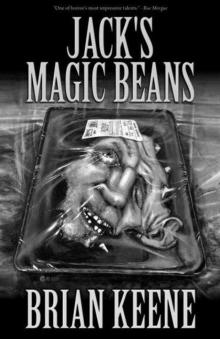 Jacks Magic Beans
Jacks Magic Beans Ghost Walk
Ghost Walk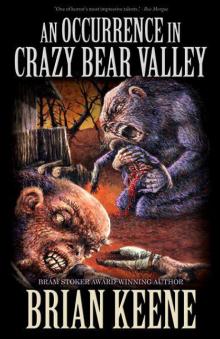 An Occurrence in Crazy Bear Valley
An Occurrence in Crazy Bear Valley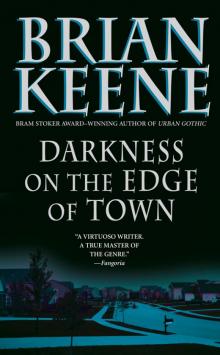 Darkness on the Edge of Town
Darkness on the Edge of Town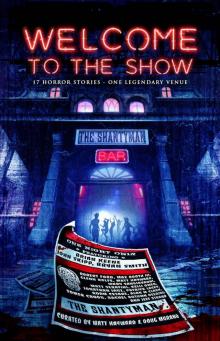 Welcome to the Show: 17 Horror Stories – One Legendary Venue
Welcome to the Show: 17 Horror Stories – One Legendary Venue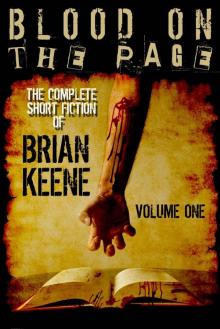 Blood on the Page: The Complete Short Fiction of Brian Keene, Volume 1
Blood on the Page: The Complete Short Fiction of Brian Keene, Volume 1 Pressure
Pressure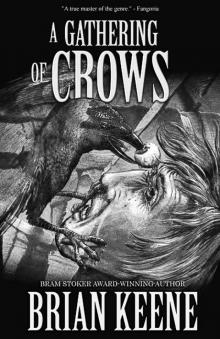 A Gathering of Crows
A Gathering of Crows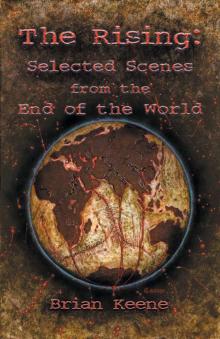 The Rising: Selected Scenes From the End of the World
The Rising: Selected Scenes From the End of the World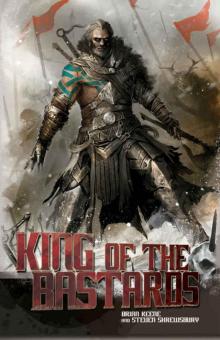 King of the Bastards
King of the Bastards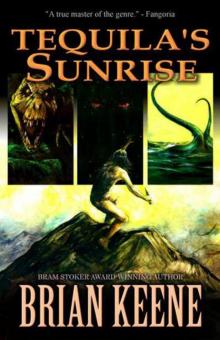 Tequila's Sunrise
Tequila's Sunrise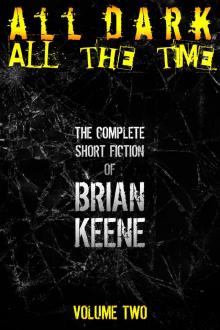 All Dark, All the Time
All Dark, All the Time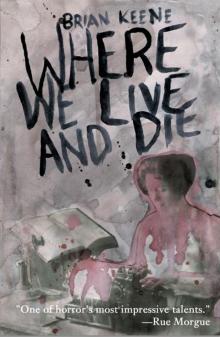 Where We Live and Die
Where We Live and Die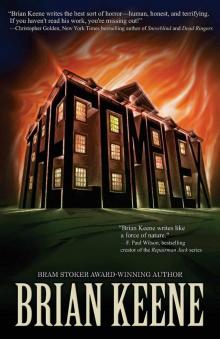 The Complex
The Complex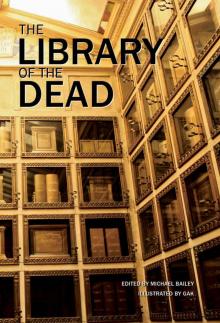 The Library of the Dead
The Library of the Dead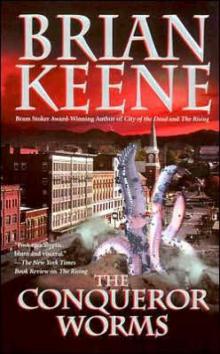 The Conqueror Worms
The Conqueror Worms The Girl on the Glider
The Girl on the Glider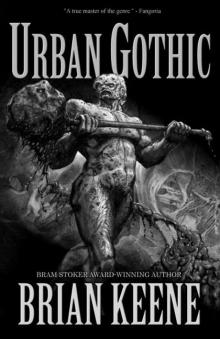 Urban Gothic
Urban Gothic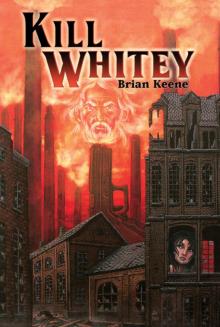 Kill Whitey
Kill Whitey Terminal
Terminal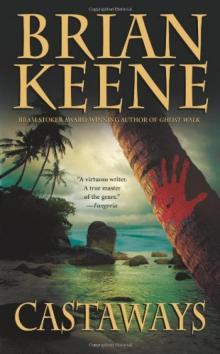 Castaways
Castaways